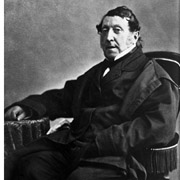Rossini composed only a few works in the last years of his life. These include the Petite Messe Solennelle which was performed privately. This chamber music version with two pianos and harmonium exists in two versions. These are now being presented for the first time in a single edition.
Rossini composed the Petite Messe Solennelle mostly in 1863, at his villa in Passy, then a suburb of Paris. He referred to the Mass, the most substantial work of his late years in Paris (from 1855 until his death in 1868), as the “last mortal sin of my old age.” The autograph manuscript of the Mass, preserved at the Rossini Foundation of Pesaro, bears an autograph dedication to the Countess Louise Pillet-Will, and two other inscriptions written directly to God. The envoi reads:
"Buon Dio, Eccola terminata questa povera piccola Messa. Ho scrtto Musica Sacra o piuttosto una Musica Maledetta? Ero nato per l'opera comica, tu lo sai bene. Non molta scienza un po' di cuore, tutto qui. Sia Tu dunque benedetto e concedimi il Paradiso."
"Gracious Lord. Here it is, finished, this poor little Mass. Have I written Sacred Music or rather Damned Music? I was born for comic opera, you know it well! Not much science, a little heart, that’s everything. Be blessed then, and grant me Paradise."
Conceived for twelve voices (four soloists, who also sing with the chorus, and eight additional choristers), and scored for two pianos and harmonium, the Mass was first performed with a slightly larger chorus before an invited public at 10:00 P.M. on Monday, 14 March 1864. The occasion celebrated the consecration of the splendid new home of the Count and Countess Alexis and Louise Pillet-Will at 12, rue de Moncey. Rossini did not attend this semi-public performance, but he participated in the dress rehearsal, before an even smaller audience, the previous afternoon.
The Petite Messe Solennelle was performed once again at the home of the Pillet-Wills, the next year. Again, a dress rehearsal was held on a Sunday afternoon, in Rossini’s presence; the formal performance following the next evening, Monday, 24 April 1865. Vocal soloists, instrumentalists, and conductor were identical to those performing the work in 1864.
Thanks to a recently recovered manuscript, still in the possession of the Pillet-Will family, we now realize that the music performed in 1864 and 1865 was different in many ways from the music we know today from Rossini’s autograph manuscript of the setting for two pianos and harmonium. Not only did it exclude the Soprano solo, “O Salutaris,” but the opening instrumental interludes and postludes to many sections were shorter and less rhetorically emphatic. The first seven, highly chromatic measures of the “Qui tollis” in the Gloria, for example, are absent: the music begins immediately with the principal accompaniment figure. Likewise, there is no twenty-bar instrumental postlude to the “Quoniam,” with its elaborate modulation into the key of the “Cum sancto spiritu”: instead, two measures conclude the section on the tonic. The instrumental conclusion of the Credo is less extended and less rhetorically emphatic in the Pillet-Will manuscript. The work, in short, was even more fitting for performance, literally, as “chamber music.” The new Bärenreiter edition makes available both versions. Th Pillet-Will version is published for the first time.
Rossini almost certainly made revisions as part of his decision to orchestrate the Petite Messe Solennelle. Although he may have begun to think about orchestrating the Mass soon after its original performances, there is no evidence he had actually begun this work until 1866. By April 1867 the work was completed. Having undertaken this effort to ensure that no one else would do it, the composer then put away his autograph manuscripts of both versions of the Petite Messe Solennelle, the version for two pianos and harmonium (now in the form it assumed during the process of orchestration) and the version with full orchestra. He allowed no further performances of either version during his lifetime.
The music he actually composed for the Pillet-Wills is finally available to modern performers.
Philip Gossett
(from [t]akte 1/2010)



